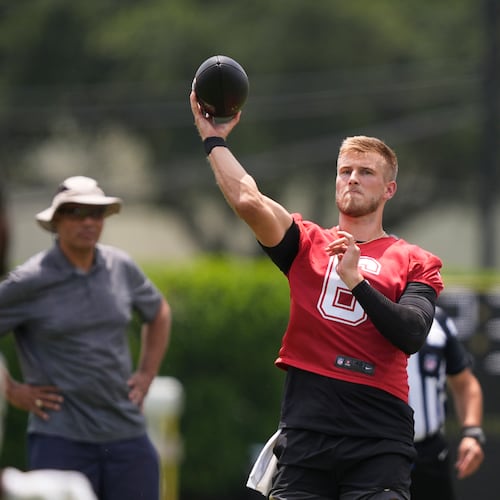Mercedes-Benz Stadium — the future home of the Falcons and the Atlanta United soccer team — will have a synthetic turf playing surface produced by GreenFields USA, the teams and the turf company announced Thursday.
Falcons President Rich McKay described GreenFields’ “MX 3-Star Turf System” in a news release as a “world-class field that is a safer surface for NFL players.”
The company, founded in 2003 and based in Union City, has its turf system in numerous soccer stadiums in The Netherlands, but hasn’t previously provided the playing surface for an NFL stadium.
Falcons officials initially hoped to have natural grass in their new stadium, but decided in 2013 that the building instead would have artificial turf.
The stadium's lead architect, Bill Johnson, told The Atlanta Journal-Constitution at the time that a detailed "sun study analysis" ruled out natural grass for the retractable-roof stadium because the field wouldn't get enough sun light to grow the grass. McKay told the AJC at the time that the multi-purpose nature of the building complicated the idea of natural grass.
“Versatility is key for our turf surface, from how the ball rolls for soccer, to safety for football, to what the paint looks like on the field and how natural the grass appears,” Mercedes-Benz Stadium General Manager Scott Jenkins said in Thursday’s announcement of the partnership with GreenFields USA.
GreenFields in 2010 became part of Netherlands-based TenCate, a group of companies in the field of textile manufacturing.
In the NFL, 18 stadiums have natural grass and 13 have artificial turf. In MLS, Atlanta United will be among a small minority of teams playing their home games on artificial turf.
Of the 20 current MLS stadiums, 16 have natural grass. The four MLS teams with synthetic turf include New England and Seattle, both of which play in NFL stadiums; the others are Vancouver and 2015 MLS Cup champion Portland.
Testing based on international soccer governing body FIFA’s protocols showed that the turf system chosen for Mercedes-Benz Stadium “closely mimics the shock-absorption and energy-restitution characteristics” of natural-grass soccer surfaces, according to Thursday’s announcement.
The $1.4 billion stadium is scheduled to open in June 2017, reflecting a recently disclosed three-month delay.
About the Author
Keep Reading
The Latest
Featured


